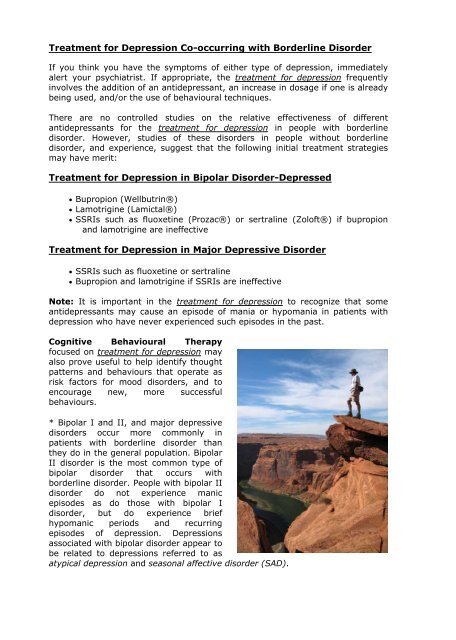personality disorders explained
Antisocial Personality Disorder, Codependence, Narcissism and Borderline
Antisocial Personality Disorder, Codependence, Narcissism and Borderline
You also want an ePaper? Increase the reach of your titles
YUMPU automatically turns print PDFs into web optimized ePapers that Google loves.
Treatment for Depression Co-occurring with Borderline Disorder<br />
If you think you have the symptoms of either type of depression, immediately<br />
alert your psychiatrist. If appropriate, the treatment for depression frequently<br />
involves the addition of an antidepressant, an increase in dosage if one is already<br />
being used, and/or the use of behavioural techniques.<br />
There are no controlled studies on the relative effectiveness of different<br />
antidepressants for the treatment for depression in people with borderline<br />
disorder. However, studies of these <strong>disorders</strong> in people without borderline<br />
disorder, and experience, suggest that the following initial treatment strategies<br />
may have merit:<br />
Treatment for Depression in Bipolar Disorder-Depressed<br />
Bupropion (Wellbutrin®)<br />
Lamotrigine (Lamictal®)<br />
SSRIs such as fluoxetine (Prozac®) or sertraline (Zoloft®) if bupropion<br />
and lamotrigine are ineffective<br />
Treatment for Depression in Major Depressive Disorder<br />
SSRIs such as fluoxetine or sertraline<br />
Bupropion and lamotrigine if SSRIs are ineffective<br />
Note: It is important in the treatment for depression to recognize that some<br />
antidepressants may cause an episode of mania or hypomania in patients with<br />
depression who have never experienced such episodes in the past.<br />
Cognitive Behavioural Therapy<br />
focused on treatment for depression may<br />
also prove useful to help identify thought<br />
patterns and behaviours that operate as<br />
risk factors for mood <strong>disorders</strong>, and to<br />
encourage new, more successful<br />
behaviours.<br />
* Bipolar I and II, and major depressive<br />
<strong>disorders</strong> occur more commonly in<br />
patients with borderline disorder than<br />
they do in the general population. Bipolar<br />
II disorder is the most common type of<br />
bipolar disorder that occurs with<br />
borderline disorder. People with bipolar II<br />
disorder do not experience manic<br />
episodes as do those with bipolar I<br />
disorder, but do experience brief<br />
hypomanic periods and recurring<br />
episodes of depression. Depressions<br />
associated with bipolar disorder appear to<br />
be related to depressions referred to as<br />
atypical depression and seasonal affective disorder (SAD).

















